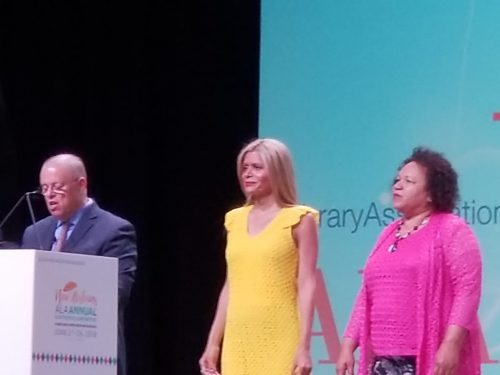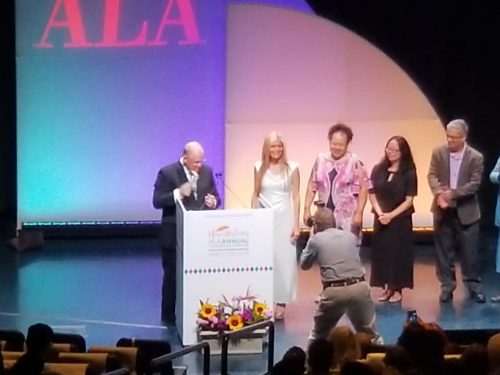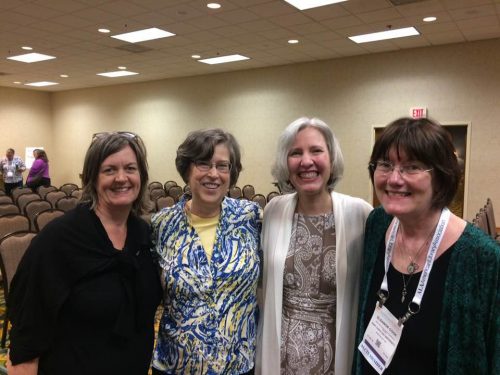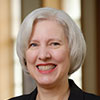This article is more than 5 years old.
Here is a 1.5 page list of random items (in chronological order). I’m happy to talk in more detail with anyone who wants to know more about anything I learned (or pushed)!
At the opening and closing sessions, officers of the ALA were introduced, including Wanda Brown as president-elect.


Photos are courtesy of UNC-G classmate Rodney Lippard.
In the opening session, Librarian of Congress Carla Hayden interviewed Michelle Obama about her life and book coming out in November, in a relatively relaxed, talk-show style. I was enchanted by a number of things the former FLOTUS said, including that her mama has been extremely important to her success, by helping with the girls and by listening more than advising: “Mmmhh! And then what happened?”
I had an extended conversation with Kevin Serpanchy, Senior Region Sales Director at ProQuest. He took several notes about my concerns with progress for accessibility requirements for streaming video and with metadata quality in bibliographic records, particularly for the Access To Own (ATO) program. I let him know that we’d like ATO to be managed through GOBI. I also talked with Ashley Fast Bailey, Director of Collection Development and Workflow Solutions at EBSCO, about wanting those ATO titles visible in GOBI to help when liaisons are doing selection. Currently, ATO can only be managed direct with ProQuest.
 I received the HARRASSOWITZ Leadership in Library Acquisitions Award and it sure helped to have friendly faces (especially from ZSR) in the audience as I stood nervously in front of the room, trying not to drop a framed certificate, while the award jury chair read a lot of text! Longtime NC and ALCTS colleague Eleanor Cook took a video and posted it to YouTube!
I received the HARRASSOWITZ Leadership in Library Acquisitions Award and it sure helped to have friendly faces (especially from ZSR) in the audience as I stood nervously in front of the room, trying not to drop a framed certificate, while the award jury chair read a lot of text! Longtime NC and ALCTS colleague Eleanor Cook took a video and posted it to YouTube!
In the ALCTS division chairs meeting, the discussion centered on ramifications of combining ALCTS, LITA, and LLAMA into a single division of ALA. During the conference, the Boards of ALCTS, LITA, and LLAMA separately approved motions to proceed in pursuit of combining. Financial feasibility had been demonstrated prior to the votes. If next steps go well, it will go to the membership for a vote. ALA Midwinter Conference may eventually be trimmed back from a full scale all-library-type conference to just focus on the children’s literature awards (Caldecott, etc.). Noting additionally ALA’s internal review of the organization, it seems that our professional associations are finally prepared to make some major adjustments to modernize.
The ALCTS/LITA Metadata Standards Committee (MSC) reviewed the game plan for our same-day program and made some decisions about publishing results of our research (in Technical Services Quarterly) and about pursuits for the coming year. The ALCTS Advocacy and Policy Committee learned that the Marrakesh Treaty legislation (to help with accessibility) does seem likely to pass. This committee also made some decisions about pursuits for the coming year and I handed the gavel metaphorically to my successor as chair, Paul Moeller. In both committees, the chairs commented on how uncommonly productive the past year had been.
Erik Michell, University Librarian at UC San Diego and co-chair of MSC, once again managed to talk me into getting up on a dais in front of a large group of people (gulp) and speak, although this time was somewhat impromptu. As part of our program, we had an interactive segment where people responded to various questions by writing on Post-its at stations around the room, and I had to aggregate and report on the comments for these particular questions: What are your decision criteria in your own organization as you identify or adopt standards? Are there specific expectations you have of the standard? Here is the program description:
The Metadata Standards Committee is studying how organizations whose primary mission includes a focus on metadata approach issues of diversity, inclusion and accessibility as part of schema design, implementation and use. This session will report on the results of a survey completed by MSC in the Fall 2017 and will include audience interaction to discuss the issues raised in this research.
As part of the presentation of results, presenters will highlight key questions and issues raised through this research and engage in a conversation with participants on these issues/questions. As part of the outreach effort for this event MSC will work to invite key stakeholders and organizations to bring a range of perspectives and create an environment where community members and organizations can engage in real-time dialogue on these issues.
Michael W. Twitty’s book, The Cooking Gene: A Journey Through African American Culinary History in the Old South, will have additional content covering his trip to Africa in the paperback edition. He’s planning a trilogy, with a next book highlighting his Jewish perspective and the third, his LGBTQ perspective. He used the word eudaimonia in his comments at the ALCTS President’s Program. He went with HarperCollins because it was the publisher that did not try to shift the focal point of his book. He had a bad experience with a library in Columbia, SC where he was told he couldn’t take a digital picture of the book he was using, that he needed to use the photocopier. He had a good experience with a librarian recently who he recognized ultimately to be a librarian who had helped him when he was 10 years old. His talk was so deep and so emotional that he shed a few tears, audience members shed a few tears, and no write-up could do it justice. This was the ALCTS President’s Program and to my knowledge, this was the first time that an academic library provided financial sponsorship for the program; the support came from the University of Kentucky Libraries, the workplace of the ALCTS President, Mary Beth Thomson.
I took a late flight home in order to attend the above session and got this spectacular view of Lake Norman at sunset.

5 Comments on ‘Lauren at ALA Annual 2018 in New Orleans’
Congratulations again on your well-deserved award. I wish I could have attended the President’s Program, it sounds like it was very worthwhile!
Wow, what a jam-packed ALA! Three things I specifically wish to respond to:
1. Congratulations on your award!!!
2. I am pleased to hear that ALA and its divisions are indicating readiness to move forward in streamlining Midwinter and looking to modernize overall. IMO they are late in doing this, but hopefully not so late that they’ve lost relevance with newer librarians (which is the chatter I hear).
3. I had the privilege of hearing Michael W. Twitty speak at Old Salem back in February and he is phenomenal. So happy he was able to share at ALA, too!
Congrats again on your award, Lauren! I’m so glad I could be there. And it’s so weird that I worked at Ball State many years ago with the guy who presented you the award.
Thanks for the thoughtful write up, and congrats again on the award. Well deserved!
[…] but what really surprised me was the relatively light security. Her conversation, as was already mentioned, was her very personal views on what it was like to live in the White House. She talked about the […]